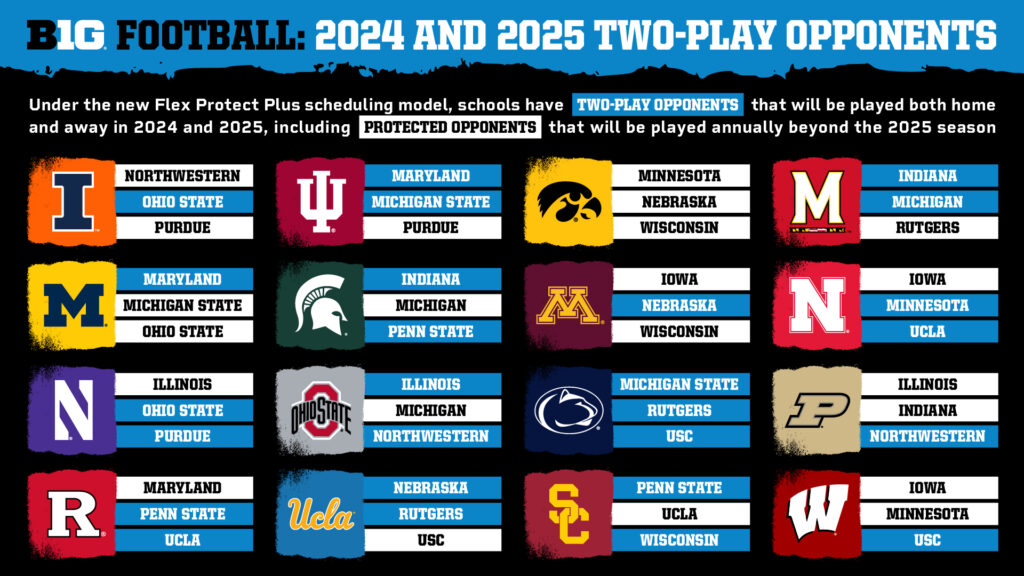Takeaways from the Big Ten's 2024-2025 schedule release: Why 'Flex Protect Plus' is good

The Big Ten is about to look a whole lot differently.
The conference unveiled its new scheduling model for the 2024 and 2025 seasons Thursday, officially ditching divisions and ushering in the new 16-team league with the marquee additions of USC and UCLA.
The days of mediocre Big Ten West teams reaching the conference title game just to get slaughtered are over. There’s balance in the league again.
Here are four takeaways on the Big Ten’s new model and schedule details…
GOOFY NAME, GOOD MODEL
Considering the Big Ten is the same conference that originally dubbed its divisions Legends and Leaders, perhaps branding isn’t the league’s best strength, but while Flex Protect Plus is a silly name, but the model is sound.
What is Flex Protect Plus?
Well, it gives each Big Ten team up to — and that’s the key here and a note the SEC should perhaps adopt, too, when it finally moves to a nine-game schedule — up to three protected annual rivals. Every team would then cycle through the rest of the league over a two-year period. The model protects storied rivalries, but it also doesn’t lock the Big Ten into a long-term scheduling trap. In two years if some new rivalries pop up organically, the “protected annual” matchups can and will change.

There was never a perfect scheduling model, but this is a solid outcome for a conference that’s going to look odd initially with USC and UCLA. They didn’t need to force permanent matchups for some teams and they didn’t. The flexibility is key.
They preserved the best of the past, present and future.
Iowa wants its three rivals annually (Minnesota, Wisconsin and Nebraska), whereas Penn State simply said give us whoever so long as it’s not Ohio State and Michigan every year. Notably, the Nittany Lions do not play the Wolverines in 2024. USC and UCLA don’t have any rivals in the league yet, so it makes sense to just rotate through the conference while playing each other annually.
Also, since the Big Ten is now a coast-to-coast conference, the flex model protects schools from too many arduous trips across the country. USC and UCLA will play every year, but other schools will just have to go to Los Angeles once a season.
SUPER 11?
To start, the Big Ten protected 11 “permanent rivals” — the aforementioned USC-UCLA, and also Michigan–Ohio State, Michigan-Michigan State, Minnesota-Wisconsin, Iowa–Nebraska, Iowa-Wisconsin, Illinois–Northwestern, Illinois-Purdue, Purdue-Indiana and Maryland–Rutgers.
Top 10
- 1New
Donald Trump blasts NFL
Teams for not drafting Sheduer Sanders
- 2
Jaden Rashada
Makes transfer commitment
- 3
Kim Mulkey
Takes victory lap on South Carolina
- 4Hot
2nd Round NFL Mock Draft
QBs under microscope
- 5
Shedeur Sanders reacts
To going undrafted in 1st round
Get the On3 Top 10 to your inbox every morning
By clicking "Subscribe to Newsletter", I agree to On3's Privacy Notice, Terms, and use of my personal information described therein.
I could take it or leave it with games like Maryland-Rutgers or Purdue-Indiana, but I get why those rivalries were protected. The rest are storied series with deep histories. So good on the Big Ten prioritizing protecting these matchups and then building a model around them. The SEC should take note.
THE BEST GAMES IN 2024?
So what are some of the marquee matchups will see starting next season?
Well, the Big Ten didn’t secure that big-money media rights deal for nothing. Outside of one VERY NOTABLE omission (more on that in a minute), they prioritized awesome TV matchups.
We’re talking Penn State-USC, Michigan-USC, UCLA-Ohio State, USC-Wisconsin, Nebraska-UCLA.
There are some classic helmet/uniform games there, plus a couple of potential repeat matchups since there are no longer divisions to play for the conference championship.
BUT SERIOUSLY, WHY NO OHIO STATE VS USC?
I noted earlier that no schedule model is perfect, and case in point: How in the world did the Big Ten create a schedule where USC and Ohio State don’t play in the first season?
I know I’m nitpicking, but these are two of the biggest brands in the sport. Penn State and Ohio State not playing in 2025 is one thing (again, PSU just didn’t want to play the Buckeyes and Wolverines every season), but for USC to not be on Ohio State’s schedule next fall seems like a major missed opportunity for the league, its media rights partners (FOX, CBS and NBC) and fans.